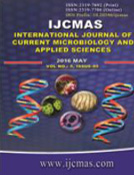


 National Academy of Agricultural Sciences (NAAS)
National Academy of Agricultural Sciences (NAAS)

|
PRINT ISSN : 2319-7692
Online ISSN : 2319-7706 Issues : 12 per year Publisher : Excellent Publishers Email : editorijcmas@gmail.com / submit@ijcmas.com Editor-in-chief: Dr.M.Prakash Index Copernicus ICV 2018: 95.39 NAAS RATING 2020: 5.38 |
The present study was conducted to assess the knowledge of married women regarding contraceptive methods in selected rural and urban community of Raikot, Ludhiana, and Punjab. The research project was undertaken by Mrs. Rajwantkaur in partial fulfillment of the requirement for the degree of Master of Science in nursing, of Baba Farid University of Health Sciences, Faridkot in 2013.Hence the researcher felt the importance to assess the knowledge of married women regarding contraceptive methods. The objective of the study were to assess the knowledge of rural and urban married women regarding contraceptive methods, to find out the relationship between the knowledge of married women with selected variables such as age, education of the women, occupation of the women, type of family, Duration of marriage, number of children, monthly income of the family, health agency facilities, source of the information. The conceptual framework of the study was based on Orem’s self care deficit (1991) theory. A comparative approach was adopted for the study. Non probability convenience sampling was used and 100 samples (rural50 and urban 50) were selected. Demography Performa was used to obtained background information of the women. The structured knowledge questionnaire was used to assess the knowledge on contraceptive methods. Descriptive and inferential statistics was used to analyze the data. Frequency and percentage, chi-square, t test, Anova were used for the analysis. Following results were drawn based on the finding of the study that urban women had better knowledge than the rural women. This study has identified that the comparison of the rural and urban women knowledge statistically significant at( p<0.05)was found with demographic variables such as age, education of the women, occupation of the women, type of family, Duration of marriage, number of children, monthly income of the family, health agency facilities, source of the information on knowledge regarding contraceptive methods. Maximum mean knowledge score percentage of urban married women was found in the area of introduction and rural women high knowledge score was found in the area of permanent methods and the least in introduction. Pamphlets on contraceptive methods were prepared by investigator to improve knowledge of married women regarding contraceptive methods. Conclusions were drawn based on findings of the study that equal attention is needed on both rural and urban women to improve their existing knowledge of contraceptive methods. Based on the experience gained during the periods of study and from the results of the study, these recommendation were made that the study can be replicated on large sample to validate and generalize its finding; similar study can be conducted in a different setting like two different cities ; An experimental study can be done to assess the effectiveness of hand book on the knowledge among married and unmarried women/men Regarding contraceptive methods in selected area; A cross sectional study can be carried out to assess the knowledge and attitude of eligible couples regarding contraceptive methods.
 |
 |
 |
 |
 |